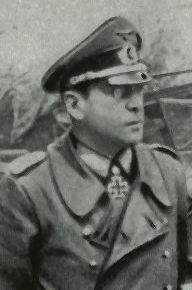Krebs, Hans
- Date of birth:
- March 4th, 1898 (Helmstedt/Braunschweig, Germany)
- Date of death:
- May 1st, 1945 (Berlin/Brandenburg, Germany)
- Nationality:
- German
Biography
Hans Krebs was born on March 4th 1898 in Helmstedt. Hans was the eldest of the two children of head teacher Otto Krebs and his wife Adele. When the First World War started, he volunteered as a 16 year old and took part in the Battle of Verdun. After the First World War he was incorporated in the new Reichswehr. He married Ilse Wittop on April 29th 1920. He has been described as a person with a “convinced National Socialist believe”. He was promoted in 1939 and transferred as a Oberst to the Oberkommando des Heeres and shortly after that appointed to Chief of General Staf of the 7.Armeekorps. In 1940 he became a Colonel and was appointed to Chief of Staff of the Armeegruppe Mitte in 1943 with the rank of Leutnant-General. He took part in the spring operations on the Eastern Front in 1943. On March 19th 19451940, Hans Krebs was appointed Chief of Staff with the Oberkommando der Wehrmacht and with that the successor of Heinz Guderian who was replaced by Hitler. With this he became the last Chief of Staff with the German Army before the capitulation. Krebs signed together with Goebbels, Wilhelm Burgdorf and Martin Bormann, Hitler’s last will and testament. When Adolf Hitler committed suicide op April 30th 1945, Krebs was appointed by Goebbels toe negotiate for peace with the Soviets. The negotiations went very well because Krebs spoke Russian what he had learned during his stay in Moscow. On May 1st 1945 he went to General Tjoekow of the 4th Russian Guards. Krebs handed him Hitlers political will together with the list of the cabinet of the new German Government. First there had to be negotiated a seace fire. This was refused by Stalin, Stalin wished an unconditional surrender of Germany. Krebs then returned to the Fuhrerbunker where Bormann accused him of being a bad negotiator. When in the afternoon on May 1st 1945 almost all important persons had fled the bunker, Krebs and Hitler’s Adjudant Wilhelm Burgdorf committed suicide in the Führerbunker round 21.30 hours.
Career:
1936 - 1939: military attaché in Moscow;
1939: Chief of Army Training Section;
1939 - 1942: Chef Generalstabes VII.Armeekorps;
1942 - 1943: Chef Generalstabes 9.Armee;
1943 - 1944: Chef Generalstabes Heeresgruppe Mitte;
1944 - 1945: Chef Generalstabes Heeresgruppe B;
1945: stellvertretende Chef Oberkommando des Heeres;
1st April 1945 - qst May 1945: Chef Oberkommando des Heeres.
Do you have more information about this person? Inform us!
- Period:
- Second World War (1939-1945)
- Awarded on:
- May 14th, 1940
Had already received the Iron Cross 2nd Class on August 22nd, 1915.
- Period:
- Second World War (1939-1945)
- Awarded on:
- May 18th, 1940
Had already received the Iron Cross 1st Class on February 6th, 1917.
- Period:
- Second World War (1939-1945)
- Rank:
- Oberst im Generalstab
- Unit:
- VII.Armeekorps
- Awarded on:
- January 26th, 1942
Award 36/6.
- Period:
- Second World War (1939-1945)
- Rank:
- Generalleutnant (Major-General)
- Unit:
- Chef des Generalstabes Heeresgruppe Mitte
- Awarded on:
- March 26th, 1944
2843rd Award.
- Period:
- Second World War (1939-1945)
- Rank:
- General der Infanterie (Lieutenant-general)
- Unit:
- Chef des Generalstabes Heeresgruppe B
- Awarded on:
- February 20th, 1945
749th Award.
Sources
- Photo 1: Wilco Vermeer
- - FELLGIEBEL, W.P., Elite of theThird Reich, Helion & Company Limited, Solihull, 2003.
- PATZWALL, K. & SCHERZER, V., Das Deutsche Kreuz 1941-1945, Band II, Verlag Klaus D. Patzwall, Norderstedt, 2001.
- THOMAS, FRANZ & WEGMANN, GüNTER, Die Eichenlaubträger 1940-1945, Biblio-Verlag, 1997.
- Kwasny A., Kwasny G., Die Eichenlaubträger 1940-1945 (CD), Deutsches Wehrkundearchiv, Lage-Waddenhausen, 2001
- Das-ritterkreuz







